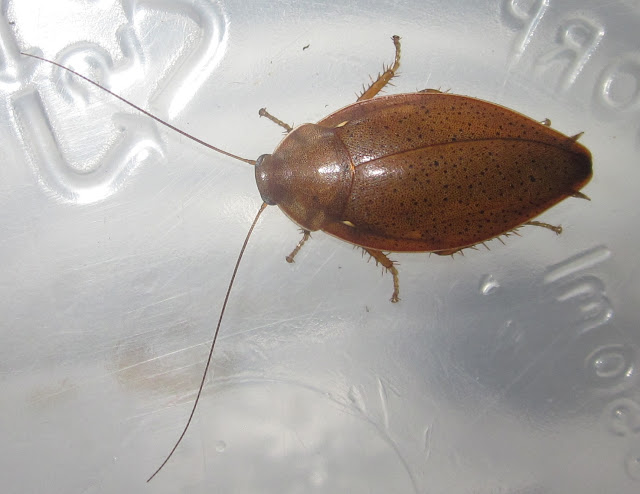Adult females have very domed wings, which they'll actually carry their first (and possibly second) instar nymphs under! Seems carrying nymphs is a common feature in arboreal Blaberids, like Pseudoglomeris magnifica and certain Perisphaerus spp....
But wait, there's more! The nymphs are born with specialized piercing mouthparts, which they use to bite into their mother's back and feed on her hemolymph (blood)!!! 😲 After they leave her back, they start eating normal roach foods, and females are unharmed by this experience and will give birth to multiple broods over their lifespan. Because of this unusual maternal behavior, I'm coining the common name of "Vampire Roach" for this species. 😁
I've got my dozen or so individuals in a tall, well ventilated setup, with a thin layer of coconut fiber as the substrate. On top of that is several inches of leaf litter, which they use for hides. I'm keeping them at around 75-85F°, and feeding them dog food, fruits, and the occasional bit of artificial pollen. This species doesn't like too stagnant or overly humid air, and usually I'd recommend a 70-30 or 50-50 horizontal humidity gradient (erring on the dryer side), however since my ambient air humidity is so abysmal, I'm keeping the entire substrate humid, but letting the upper layer of leaf litter dry out in between mistings.
Here are some pictures of the cuties:
 |
| Adult female |
 |
| Adult male |
 |
| Large nymph |
Such a neat species, one I've been dying to see established in the US for forever, so hopefully me and my friends will be able to do just that. 😁
Next up, we also got some ooths of what SHOULD be true Polyphaga obscura "Turkmenistan". This species is very similar to P.saussurei in appearance, and this particular stock is also parthenogenetic like the dominant P.saussurei stock in captivity is. However, obscura are smaller than saussurei, and a bit duller in coloration as well (supposedly they have slight differences in ooth shape/structure as well, but I've been unable to verify this yet). This parthenogenetic stock of obscura seems to be a lot slower breeding/less prolific than saussurei as well.
Unfortunately, it seems most "obscura" stocks in culture are actually just mislabeled saussurei, as the two are quite similar in appearance and thus easy to confuse, plus saussurei breed better and so are spread around the hobby much faster than actual obscura. However, this stock I sourced seems reliable and should be actual obscura. Time will tell I guess.
Anyways, I got my two ooths in a well ventilated enclosure, with an inch or so of coconut fiber substrate, topped with crushed leaf litter. I'm keeping a third of the substrate humid, the rest bone dry (and have the ooths buried on the dry side). I'm keeping them at 75-80F°.
Here is a crappy phone pic of the ooths:
Hopefully these are real obscura, and hopefully they all hatch, it would be great to get these established in the US hobby! 😃
A big thanks to Adriano Biressi for these species, he did a great job with the packing and was an absolute pleasure to deal with overall. 😄
Well, that does it for this post, thanks for reading, hope everyone enjoyed, and I'll see you all next time! 😉
































No comments:
Post a Comment